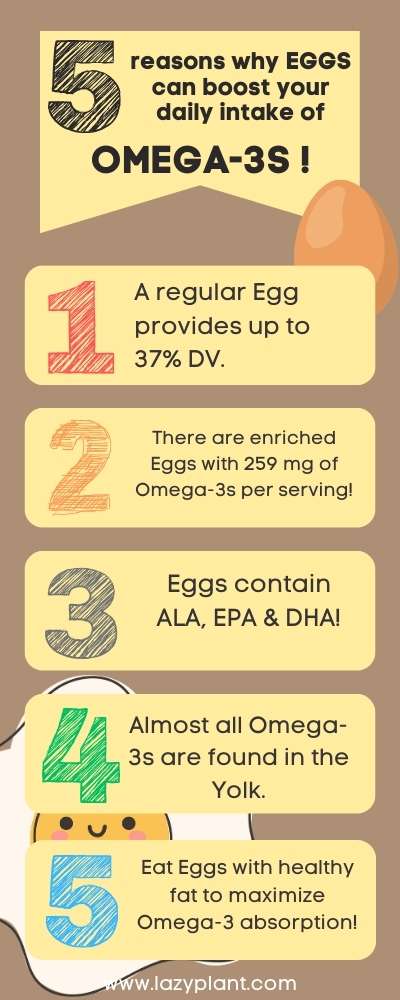Eggs are a great dietary source of omega-3 fatty acids. A typical commercial egg contains up to 92 mg which is roughly 37% of the Daily Value! There are even enriched eggs, containing up to 259 mg of omega-3s per egg!
Thus, eggs can help us meet our daily needs of omega-3s. Try to use them in recipes with other omega-3-rich foods, like fatty fish, chia seeds, flaxseeds, walnuts, or avocado!
Eating eggs high in Omega-3s is good for the Heart
Omega-3 fatty acids are essential polyunsaturated fats that play a crucial role in supporting various aspects of health, particularly cardiovascular health and brain function. Enriched eggs could help lower triglycerides, and reduce high blood pressure.
Consuming eggs high in omega-3s may reduce blood cholesterol by 16.57 mg/dL, increase HDL cholesterol concentrations by 0.48 mg/dL, and reduce triglyceride by 17.48 mg/dL.[1]
Also, eggs rich in omega-3s may lower blood glucose and improve insulin sensitivity.[2]
How much Omega-3s are in Eggs?
Eggs are great dietary sources of omega-3s. A typical commercial egg contains 92 mg of omega-3s.[3]
How are Eggs enriched with Omega-3s?
As omega-3s have many health benefits, certain egg companies produce eggs with more omega-3s. Feeding hens with flaxseeds, chia seeds, and fish oils significantly increases the omega-3 fatty acid concentration of the egg’s yolk.[4]
An enriched egg contains up to 259 mg of omega-3s. Hence, omega-3-rich eggs may contain 180% more omega-3s than typical commercial eggs!
Just for comparison, a 3-oz serving of sardines or salmon provides about 2,000 mg of omega-3s.
Omega-3-rich eggs can contain almost 3 times more omega-3s than typical commercial eggs!
What types of Omega-3s are present in Eggs?
Eggs rich in omega-3s contain ALA, EPA, and DHA. These are the 3 types of omega-3s. ALA is mainly found in plant-based foods high in omega-3s, while EPA and DHA are found in animal-based foods high in omega-3s, such as fish oil.
An enriched egg contain about:
- ALA 167 mg
- EPA 7 mg
- DHA 84 mg
Omega-3s are found in the Yolk
Omega-3s in eggs are primarily found in the yolk. Only trace amounts might be present in the white and eggshell, the yolk is the main source of these essential fatty acids.
Choosing eggs specifically labeled as “omega-3 enriched,” is an effective way to ensure higher omega-3 intake from eggs.
Do darker eggs contain more Omega-3s?
No, the color of the eggshell does not significantly impact the omega-3 content of the egg. The diet of the hen is the primary factor determining the omega-3 content, not the eggshell color.
The pigment responsible for the brown or white color of the eggshell is unrelated to the nutritional content of the egg, including omega-3s.
Certain breeds, like brown Leghorns or Rhode Island Reds, are naturally predisposed to lay eggs with slightly higher omega-3 levels compared to other breeds. While the difference in omega-3 content between brown and white eggs might be slightly higher in some cases due to breed variations, it’s generally minimal and not a reliable indicator.
Focusing on the hen’s diet and breed could significantly improve omega-3 concentrations of eggs.
Do we absorb Omega-3s in Eggs?
Yes, we do absorb omega-3s from eggs, but the absorption rate is lower compared to some other sources.
While eggs contain omega-3s, primarily in the form of alpha-linolenic acid (ALA), the body’s ability to convert ALA into the more active forms, EPA and DHA, is limited. This conversion process is inefficient, resulting in lower absorption of omega-3s from eggs compared to sources rich in EPA and DHA.
Various factors can influence the absorption of omega-3s from eggs, including individual differences in metabolism, the presence of other dietary components like saturated fat, and cooking methods.
Maximizing Omega-3 Absorption
Consuming eggs alongside healthy fats like olive oil or avocado can potentially enhance ALA absorption. Also, using gentle cooking methods might help preserve the omega-3 content in eggs.

Does Cooking destroy Omega-3s?
Cooking does not significantly destroy omega-3s in eggs or other food sources. Omega-3s are relatively stable molecules and can withstand moderate heat exposure during common cooking methods like boiling, frying, or baking.
However, it’s important to note that excessive heat and prolonged cooking times can potentially lead to some omega-3 degradation. Therefore, using moderate heat and avoiding overcooking can help preserve the nutrient content.
Since most omega-3s in eggs are concentrated in the yolk, prioritizing cooking methods that minimize damage to the yolk is beneficial for preserving their nutritional value.
Best Cooking Methods:
- Poaching: This gentle method involves simmering eggs in water without boiling. It cooks the egg white thoroughly while keeping the yolk runny, minimizing potential damage to omega-3s.
- Steaming: Steaming eggs exposes them to minimal heat and moisture, ensuring even cooking without overdoing the yolk, thus preserving omega-3 content.
- Soft-boiling: Boiling eggs for a shorter duration allows the white to set while keeping the yolk soft and creamy, minimizing potential omega-3 degradation.
Less Optimal Methods:
- Scrambled eggs: While scrambling involves some heat exposure, using moderate heat and avoiding overcooking can help retain a significant portion of the omega-3s in the yolk.
- Frying: While popular, frying exposes eggs to high heat for a longer duration, potentially leading to some omega-3 degradation, particularly if the yolk is cooked hard.
- Hard-boiling: Boiling eggs for extended periods can significantly harden the yolk and potentially lead to a greater loss of omega-3s compared to gentler methods.
Worst Cooking Methods:
- Microwaving: Microwaving eggs can lead to uneven cooking, with some parts overcooked and others undercooked. This can potentially damage omega-3s in both overcooked and undercooked portions.
Cooking Tips:
- Use moderate heat: Regardless of the cooking method, avoid using excessively high heat, as it can contribute to omega-3 degradation.
- Don’t overcook: Aim for the desired level of doneness, especially for the yolk, to minimize potential nutrient loss.
- Freshness matters: Choose fresh eggs whenever possible, as omega-3 content can slightly decrease over storage time.
Even the “best” cooking methods might involve some degree of degradation of omega-3s, as well as other vitamins and minerals in eggs.
Do Vegan eggs replacers have any Omega-3s?
The omega-3 content of vegan egg replacers varies depending on the specific ingredients used. Some replacers might contain ingredients naturally rich in omega-3s, while others might not.
Sources of Omega-3s in Vegan Egg Replacers:
- Flaxseed meal: One of the most common vegan egg replacers, flaxseed meal is a rich source of alpha-linolenic acid (ALA), a plant-based omega-3 fatty acid. One tablespoon of flaxseed meal provides around 1.8 grams of ALA.
- Chia seeds: Another popular option, chia seeds also contain ALA, although in lower amounts compared to flaxseed. One tablespoon of chia seeds provides around 0.5 grams of ALA.
- Walnuts and other nuts: Some egg replacers might incorporate finely ground nuts like walnuts, which contain decent amounts of ALA.
Commercial egg replacer powders often contain ingredients like starches, flours, and leavening agents, which typically do not have significant omega-3 content.

Considerations:
- Check the ingredients list: The presence of ingredients like flaxseed meal, chia seeds, or walnuts in the egg replacer indicates the potential for omega-3 content.
- Amount and absorption: Even if an egg replacer contains omega-3s, the amount might be lower compared to animal sources like eggs. Additionally, the body’s conversion of ALA from plant sources to the more active forms of omega-3s (EPA and DHA) is limited.
- Overall diet: Relying solely on vegan egg replacers for omega-3s is not recommended. Include other sources of omega-3s in your diet, such as algae oil supplements or certain vegetables like walnuts, canola, and chia seeds.
You’ll find a wide variety of commercial vegan egg replacers on Amazon.
Other foods rich in Omega-3s
Certain seeds, walnuts, canola oil, and soybean oil are the richest plant-based foods in omega-3s, providing up to 2,300 mg of omega-3s (as ALA) per serving! Avocado has decent amounts as well. Actually, only a few seeds and nuts are particularly rich in omega-3s.
Fatty Fish, like salmon, mackerel, sardines, herring, anchovies, and trout are also excellent dietary sources of omega-3s. A serving provides higher amounts than we need in a day!
In any case, we shouldn’t consume extremely high amounts of omega-3s, either from food, or supplements.
Health benefits of eating foods high in omega-3s
Omega-3 fatty acids are responsible for numerous cellular functions, such as signaling, cell membrane fluidity, and structural maintenance. Moreover, they regulate the nervous system, blood pressure, hematic clotting, glucose tolerance, and inflammatory processes. They may protect from inflammatory diseases.[5]
Also, they’re involved in skeletal muscle metabolism. Getting adequate amounts may help prevent osteoporosis.
Furthermore, omega-3 fatty acids play a key role in the brain and eye development and function.[6]
Can I depend on Eggs for Omega-3s?
While eggs do contain some omega-3s, you should not solely rely on them as your primary source.
One large egg typically provides between 50 and 90 mg of omega-3s, while the recommended daily intake for adults is generally around 250 mg. An egg can provide up to 37% of the Daily Value!
So, can I eat 2-3 eggs a day to boost my omega-3 intake?
After all, eggs support weight loss, as they have only a few calories, and they’re great dietary sources of choline, vitamin B12, vitamin D, and vitamin A!
But, it’s better to consume up to an egg per day, due to their high cholesterol and saturated fat content. Eggs are among the richest foods in cholesterol.
Also, they’re high in saturated fats. An egg contains about 1.6 grams of saturated fats which is 12% of the maximum safe intake.[7]
An egg can provide up to 37% of the Daily Value of Omega-3s!
Recipes Ideas to skyrocket your daily Omega-3 intake!
Breakfast
- Smoked Salmon Frittata with Spinach and Feta (300 mg omega-3s): Combine scrambled eggs with smoked salmon, chopped spinach, and crumbled feta cheese. Bake in a skillet until set.
- Avocado Toast with Poached Eggs and Flaxseed (250 mg omega-3s): Mash avocado on whole-wheat toast, top with poached eggs, and sprinkle with ground flaxseed.
Lunch-Dinner
- Tuna Salad with Eggs and Avocado (250 mg omega-3s): Mix canned tuna with chopped celery, onion, a chopped hard-boiled egg, and mashed avocado. Serve on lettuce leaves. Did you know that avocado has omega-3s?
- Mediterranean Chickpea Salad Bowl (280 mg omega-3s): Combine cooked chickpeas, chopped vegetables like tomatoes, cucumbers, and onions, crumbled feta cheese, and a hard-boiled egg. Drizzle with olive oil and lemon juice.

- One-Pan Shrimp and Veggie Scramble with Quinoa (320 mg omega-3s): Toss 1 cup cooked quinoa with 1 tablespoon olive oil, salt, and pepper. Spread on a baking sheet and bake for 10 minutes. Sauté 1 cup chopped vegetables like broccoli, carrots, and bell peppers. Add 5 oz peeled and deveined shrimp (1.5g omega-3s) and cook until pink and opaque. Pour 4 beaten eggs into the pan and scramble until cooked through. Combine the cooked quinoa, shrimp, and vegetables. Season with additional salt and pepper if desired.
- Salmon Frittata with Roasted Vegetables (350 mg omega-3s): In a bowl, whisk together 6 eggs, 1/4 cup milk, 1/4 cup grated Parmesan cheese, salt, and pepper. Sauté 1 cup chopped vegetables like onions, peppers, and mushrooms in olive oil until softened. Flake 4 oz cooked salmon (3.5g omega-3s) and add it to the vegetable mixture. Pour the egg mixture into a greased oven-proof skillet. Top with the salmon and vegetables. Bake for 20-25 minutes or until set and golden brown.
Snacks
- Hard-boiled Eggs with Flaxseed Crackers (120 mg omega-3s): Enjoy hard-boiled eggs with flaxseed crackers for a protein and omega-3-rich snack.
- Scrambled Eggs with Spinach and Walnuts (150 mg omega-3s): Whisk together eggs and milk in a bowl. Heat a non-stick pan over medium heat. Add the spinach and cook until wilted. Pour in the egg mixture and scramble until cooked through. Stir in the walnuts and season with salt and pepper.
These are estimates, and the actual omega-3 content can vary depending on the specific ingredients and portion sizes used.
Should I take Omega-3 Supplements?
Omega-3 supplements can be beneficial for individuals who don’t consume enough omega-3-rich foods in their diet. However, it’s crucial to consult your doctor before starting any supplements, consider your individual needs and potential risks, and prioritize dietary sources whenever possible. Remember, a balanced and varied diet remains the foundation for optimal health.
Whether or not you should take omega-3 supplements depends on several factors, including your dietary intake, overall health, and individual needs.
Supplements can help bridge the gap if your diet lacks sufficient omega-3-rich foods like fatty fish, chia seeds, or walnuts. If you regularly consume fatty fish (salmon, tuna, mackerel) at least twice a week, you might not need additional omega-3s from supplements.
Look for supplements from reputable brands with third-party certifications for purity and potency.
You can find a wide variety of omega-3 supplements on iHerb. There are even vegan omega-3 supplements from algae!
9 Myths for Omega-3s in Eggs!
Myth 1: Eggs contain omega-3s only if they are labeled as enriched. Reality: While enriched eggs have higher omega-3 levels, regular eggs also contain omega-3s, albeit in smaller amounts.
Myth 2: All eggs have the same omega-3 content. Reality: Omega-3 content can vary based on factors like the chicken’s diet. Pasture-raised or omega-3 enriched eggs may have higher levels.

Myth 3: Cooking methods don’t affect omega-3 levels in eggs. Reality: Prolonged cooking or high heat can degrade omega-3s in eggs. Gentle cooking methods may help preserve them.
Myth 4: All omega-3s in eggs are equally beneficial. Reality: Eggs contain different types of omega-3s. While EPA and DHA are more beneficial, eggs primarily provide ALA.
Myth 5: Omega-3s in eggs are only beneficial for heart health. Reality: Omega-3s play a role in brain health, inflammation reduction, and overall well-being.
Myth 6: You can rely solely on eggs for omega-3 intake. Reality: A varied diet with multiple omega-3 sources is crucial for optimal health.
Myth 7: Omega-3 eggs are the best source of omega-3s. Reality: Fatty fish like salmon, mackerel, and chia seeds provide higher levels of omega-3s than eggs.
Myth 8: Omega-3s in eggs are not affected by the chicken’s diet. Reality: A diet rich in omega-3s for chickens contributes to higher omega-3 levels in eggs.
Myth 9: Eating omega-3 eggs eliminates the need for fish in the diet. Reality: Fish provides a more concentrated and beneficial form of omega-3s compared to eggs.
